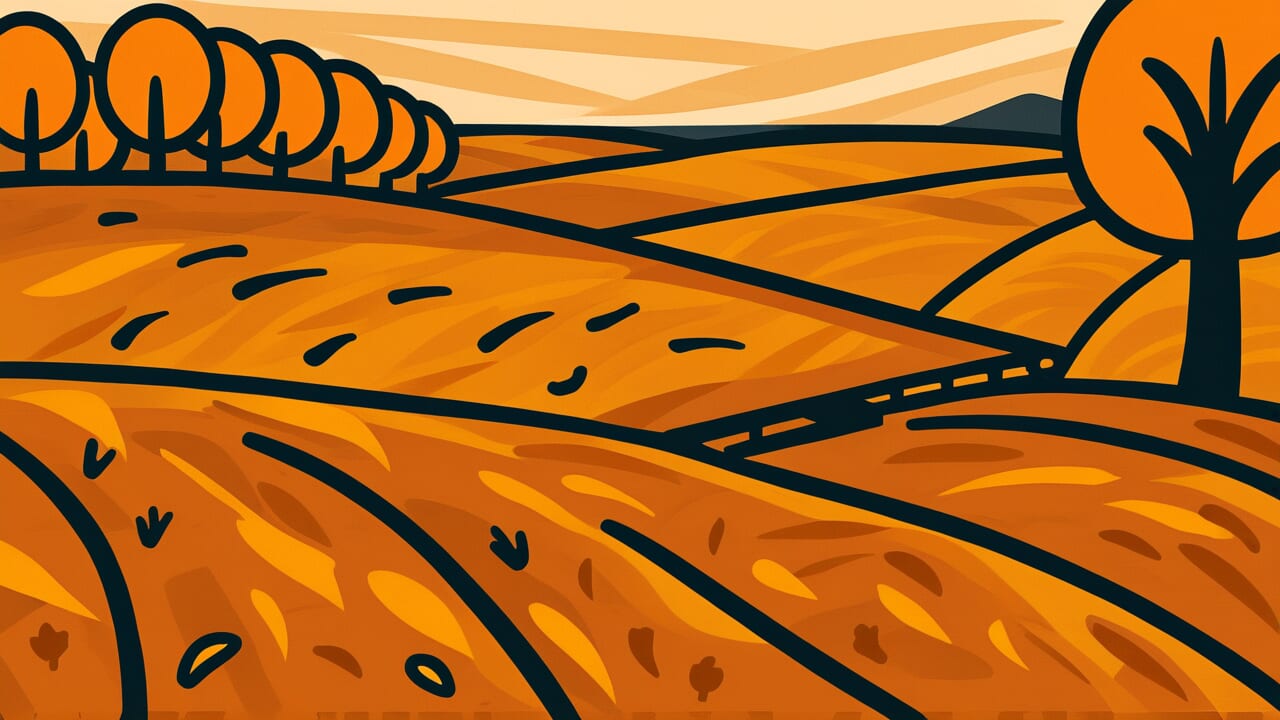How to Read “Autumn storms, half a harvest”
Akiare hansaku
Meaning of “Autumn storms, half a harvest”
“Autumn storms, half a harvest” is a proverb about bad fall weather ruining crops. It means that storms in autumn can cut the harvest down to only half of what farmers expected.
Farmers work hard from spring through summer to grow rice and vegetables. But when harvest time comes in fall, bad weather can strike. Typhoons, heavy rain, or cold snaps can destroy much of the crop.
Farmers have used this saying for generations. They say it when they worry about fall weather. They also use it when storms actually damage their crops.
When someone says “This year is autumn storms, half a harvest,” everyone understands right away. It means the bad weather has caused serious crop losses.
Even today, people in farming communities know this proverb well. It reminds them that weather can make or break their harvest. Farmers watch fall weather forecasts carefully and remember this old warning.
Origin and Etymology
Nobody knows exactly when people first said “Autumn storms, half a harvest.” But farmers in Japan have passed down this saying for many generations.
The proverb has two parts: “autumn storms” and “half a harvest.” Each part tells an important story.
“Autumn storms” means the sudden bad weather that hits during harvest season. This includes typhoons, long rainy periods, and sudden cold weather. These are all common in fall.
Japan’s location makes fall weather tricky. Cold air from the continent meets warm Pacific air. This clash creates unstable weather. Plus, typhoons often pass through Japan in autumn.
“Half a harvest” is simple and direct. It means getting only half the normal crop. The word “harvest” appears in other farming terms too, like “good harvest” or “bad harvest.”
Using the specific number “half” makes the problem clear. It shows just how serious the damage can be.
Farmers put these two ideas together to create a powerful warning. Fall weather determined whether their year of hard work would pay off. This saying came from real experience and real worry.
Generation after generation of farmers remembered this lesson. They taught it to their children as a warning to always respect nature’s power.
Usage Examples
- This year, typhoons kept coming and we got autumn storms, half a harvest. The farmers are really struggling.
- The crops were growing so well, but autumn storms, half a harvest means all that hard work was for nothing.
Universal Wisdom
“Autumn storms, half a harvest” teaches us about human effort versus nature’s power. We make plans, work hard, and expect results. But sometimes, unexpected events change everything at the last moment.
This proverb has survived because it teaches humility. It reminds us that humans cannot control nature. Farmers spend months caring for their crops every single day.
They manage water levels, pull weeds, fight pests, and tend their fields with love. Their effort is huge. Yet just a few days of bad weather at harvest time can destroy months of work.
This reality mirrors life itself. We think we can control outcomes, but we can’t control everything. Forces beyond our power always exist.
Still, farmers never gave up. Every year, they planted seeds again. They kept hoping and working. This proverb shows both human strength and respect for nature at the same time.
Our ancestors wanted us to understand something important. We must recognize both human effort and nature’s rules. We need to respect both to live wisely.
When AI Hears This
Chaos theory reveals something amazing about autumn weather and harvests. For rice, the 40 days from flowering to harvest are a “critical window.” If temperature drops just 2 degrees below normal, pollination rates fall by 30 percent.
Two degrees feels like “slightly cool” to humans. But for plant reproduction, it’s devastating. This tiny change creates huge effects.
Chaos theory says small changes get amplified when systems reach “critical points.” Rice flowering is exactly at this critical state. One day without sun from a typhoon stops photosynthesis.
But it also messes up the timing of nutrient transfer later. The final harvest can be affected 10 times more than expected. One day of loss becomes 10 days of results.
Interestingly, no similar proverb exists for spring weather. In spring, plants are still growing. They have time to recover from problems.
But autumn is the final stage. There’s no time for the butterfly effect to be fixed before harvest. Ancient farmers understood “time asymmetry in nonlinear systems” just from experience.
Lessons for Today
“Autumn storms, half a harvest” teaches us to value the process, not just results. What should we do when our hard work doesn’t bring the results we hoped for?
This proverb shows us wisdom about accepting what we cannot control. Modern life makes us think everything should go as planned. But unexpected things happen all the time in real life.
Important projects can fail at the last stage. Years of preparation can become useless when circumstances suddenly change. This happens to everyone.
But farmers plant seeds again the next year. We can keep trying too, without fearing failure. Even when results disappoint us, the experience and growth we gained aren’t wasted.
Actually, doing our best despite uncertainty has meaning by itself. The process matters as much as the outcome.
When your efforts seem unrewarded, that doesn’t mean you have no value. Accept nature’s rules with humility, but keep moving forward with hope.
This proverb gives us that kind of strength. It teaches us to be both realistic and optimistic at the same time.



Comments